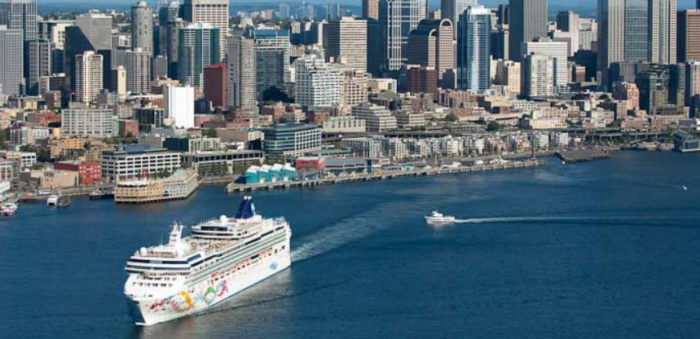In an exclusive interview with SAFETY4SEA, Mr. Andreas Chrysostomou, just few days before joining Tototheo Maritime, provided an overview of the cruise industry. Having accumulated vast experience in the global cruise industry as Act. Secretary General at CLIA Europe, he referred to the future travel trends and discussed about the emerging challenges. As explained, cruise lines have taken considerable action to anticipate cyber risks and head towards exceeding the environmental regulatory requirements. Nowadays, cruise ships are designed for greatest efficiency, Mr. Chrysostomou added, insisting on uniform regulatory framework to outweigh complex differences between countries.
Many of the environmental technologies found onboard ships were pioneered by the cruise industry itself, including advanced wastewater treatment systems and EGCS
SAFETY4SEA: The cruise market has seen impressive growth over the past few years, do you see this continuing in the short/long term of say five to ten years?
Andreas Chrysostomou: The cruise industry has experienced exponential growth for the past ten years. This is linked to increased investment in new ships from many cruise companies, bringing increased capacity every year. The current cruise industry ship order book continued to grow year after year. 17 new ocean cruise ships will be delivered in 2018 and 92 are expected by 2025. With the increase capacity of lower berths, estimated to be 233,000 more in the next 7 years, the number of passengers interested in cruising is equally booming.
S4S: How would you assess the current safety and security status/condition on board cruise ships? Are there any emerging risks to focus for the time being and/or the years ahead?
A.C.: Safety and security is of prime concern to our members. A cruise vacation remains one of the safest forms of travel, and the safety of its passengers and crew remains the top priority of cruise lines. A recent study by G.P. Wild, analyzing cruise ship operational incidents shows that while worldwide cruise ship capacity grew by more than 41.5 percent from 2009 to 2016, over that same eight-year period the number of significant operational incidents has trended down with an average of 19.4 incidents per year, prioritizing cruise lines’ safety record ahead of other modes of leisure transportation. The cruise industry has a long history of ongoing review and improvement. The comfort and care of passengers is always at the forefront of our efforts, and the industry will continue to advance best practices and policies for the safety of guests.
S4S: Is the cruise industry secure from cyber risks? What are the key concerns across the cruise sector?
A.C.: The cruise industry is actively engaged in efforts to protect cruise ship computer systems in collaboration with a joint shipping industry group. This group established the Guidelines on Cyber Security Onboard Ships, which provide valuable information on applying a risk-based approach to areas of concern, including how an individual’s unwitting actions might expose their organization to cyber risks.
Acknowledged by the IMO, these Guidelines have been well received by the industry and offer the most comprehensive guidance for the shipping industry today. The Guidelines are reviewed and updated on an ongoing basis. The key concern for our cruise lines members is to continue all efforts to protect cyber security onboard ships and in all data systems, to anticipate any future risks. The Guidelines on Cyber Security Onboard Ships is available to download on the joint industry working group websites, including CLIA, visit: https://goo.gl/pUauCE
S4S: Which are the top cruise travel trends with respect to sustainability for the coming year?
A.C.: Many cruise lines not only meet but exceed environmental regulatory requirements, and all our members have to. While cruise ships comprise less than 1 percent of the commercial vessels worldwide, they are at the forefront in developing responsible environmental practices and innovative technologies that lead the world’s shipping sector in reducing air emissions and treating and disposing of waste.
Cruise ships are designed for greatest efficiency. From concept to operations, cruise ships offer elaborate systems of design, construction, manufacturing and supply chain management, training and performance that are years in the making, all to ensure that cruise ships sail as efficiently and environmentally friendly as possible.
Many of the environmental technologies found onboard ships were pioneered by the cruise industry itself, including advanced wastewater treatment systems and exhaust gas cleaning systems. Advanced wastewater treatment systems used on many ships can produce cleaner water than the systems in most coastal cities. Additionally, exhaust gas cleaning systems have been shown to reduce by as much as 98 percent the level of sulfur oxides in a ship’s exhaust, offering an effective alternative to low-sulfur fuels to achieve emissions reduction goals.
The cruise industry often leads the maritime community in developing, promoting and implementing policies and practices that exceed international regulations and requirements to reduce waste and emissions. And, because our ships sail the globe, it is essential that regulations are as uniform as possible and don’t entail complex differences from country to country.
S4S: Given the ongoing discussion for the role of women in shipping do you think that we need more females on leadership roles or more leaders acting on a female mode?
A.C.: The Cruise industry encourages female to be leaders. It has many female leaders, even in technical roles, such as cruise ship captains, but our cruise segment remains a small percentage of the shipping sector, we will continue to contribute as best we can to encourage female leadership in cruising. At CLIA, we have many ladies at the helm. Our CEO, Cindy d’Aoust, is a very successful cruise industry leader for instance.
The Cruise industry many female leaders, even in technical roles, such as cruise ship captains
 Andreas Chrysostomou needs little introduction having accumulated vast experience in the global shipping industry throughout his noteworthy career and had held a number of High profile positions in Cyprus and in Europe. Mr Chrysostomou’s accomplishments have been recognized by the shipping industry worldwide and he has received Award for “Outstanding Contribution to Sustainable Shipping” and the “Distinguished Public Service Award” by the United States Department of Homeland Security, United States Coast Guard in 2011. He has also been awarded with the “Green Shipping Technology Award – Leading Shipping Personality of the Decade 2003 – 2013” and he was named “International Personality of the Year” in 2015 by Lloyd’s List Greek Shipping Awards. Recently, it was announced that Mr Chrystostomou has joined Tototheo Maritime as Chief Strategy Officer to play a key role in developing and implementing the global satellite communications and technology provider’s strategic vision.
Andreas Chrysostomou needs little introduction having accumulated vast experience in the global shipping industry throughout his noteworthy career and had held a number of High profile positions in Cyprus and in Europe. Mr Chrysostomou’s accomplishments have been recognized by the shipping industry worldwide and he has received Award for “Outstanding Contribution to Sustainable Shipping” and the “Distinguished Public Service Award” by the United States Department of Homeland Security, United States Coast Guard in 2011. He has also been awarded with the “Green Shipping Technology Award – Leading Shipping Personality of the Decade 2003 – 2013” and he was named “International Personality of the Year” in 2015 by Lloyd’s List Greek Shipping Awards. Recently, it was announced that Mr Chrystostomou has joined Tototheo Maritime as Chief Strategy Officer to play a key role in developing and implementing the global satellite communications and technology provider’s strategic vision.

Accrording to CLIA Outlook, in 2018:
- 2 million passengers are expected to cruise
- Demand for cruising has increased by 20.5% (2011-2016 in Millions)
- 33% of cruisers surveyed who have taken a cruise within the past three years, have a household income less than $80K.
- River and small ship cruising continues to gain traction among travelers, specifically the Millennial set.
- Grandparents traveling with grandchildren (without their parents) is predicted to be highly popular in 2018 and beyond
- A rise in traveler-friendly onboard technologies that enhance travel experiences is expected
- More sustainable tourism practices are predicted to be put in place
The views presented hereabove are only those of the author and not necessarily those of SAFETY4SEA and are for information sharing and discussion purposes only.































































